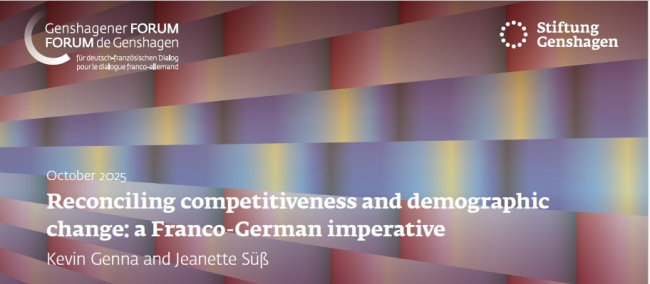Towards Geopolitical German Development Cooperation? Recent History, Current Trends, and Future Prospects
German development cooperation (GDC) in a post-Merkel era can be expected to become more geopolitical. Recently adopted German policy documents like the Indo-Pacific guidelines as well as the support to the geopolitical ambition of the European Commission suggest such a tendency for future German policy making.
As Germany is a major player in international development cooperation, at least with regard to the amount of official development assistance (ODA), the future prospects of GDC are highly relevant to German international political and development partners.
GDC has recently seen significant shifts linked to the issue of migration and flight and also to a much stronger involvement by the private sector in development cooperation. Several German policy initiatives like Compact with Africa are exemplary for these trends. Moreover, they show that GDC focuses strongly on the African continent. The so-called BMZ 2030 reform of the Bundesministerium für wirtschaftliche Zusammenarbeit und Entwicklung – BMZ (the German Federal Ministry for Economic Cooperation and Development) underlines the ambition of GDC as relevant to current international trends.
The next German government will have to clarify the relationship of GDC with joint European approaches to development cooperation. Germany generally supports the politicization of European development cooperation and a more geopolitical thinking at the European level. Yet other political priorities, such as the French-German relationship, regularly limit German support for joint European policy-making in practice, as can be observed in Germany´s policies for the Sahel region.
This paper argues that GDC under a post-Merkel government will have to seek new legitimacy and thus German policy makers should look beyond mere geopolitical approaches. While little new thinking can be expected from the political parties of a new governing coalition – probably including the Green Party – development cooperation will be challenged by right-wing populists. The situation provides opportunities, however, to link geostrategic thinking with a more progressive development cooperation that builds on the 2030 Agenda for Sustainable Development.
Dr Manfred Öhm, currently acts as the Deputy Head of Finance and Organization of the Friedrich-Ebert-Stiftung (FES). He has lectured at the University of Freiburg (Arnold Bergstraesser Institute for Cultural Studies). He formerly served as country director for the Friedrich Ebert Foundation in Sudan and Mozambique and headed the FES Africa Department from 2013 to 2021.
This publication is available in french (pdf): La coopération allemande pour le développement : vers une évolution géopolitique ? Histoire récente, tendances actuelles et perspectives d’avenir.
Download the full analysis
This page contains only a summary of our work. If you would like to have access to all the information from our research on the subject, you can download the full version in PDF format.
Towards Geopolitical German Development Cooperation? Recent History, Current Trends, and Future Prospects
Related centers and programs
Discover our other research centers and programsFind out more
Discover all our analysesMerz’ European Policy-making: The End of the ‘German Vote’?
Friedrich Merz’s European ambition is to turn Germany, long seen as hesitant into a leading actor within the European Union (EU). To that end, he has pledged to end the “German vote,” a phenomenon that epitomizes the paradox of a country both indispensable and frequently absent from European decision-making.

Securing critical raw material (CRM) value chains – a prerequisite for Europe’s technological resilience
At the heart of economic security, technological resilience is a backbone of the European Union’s (EU) competitiveness. The EU’s energy and digital transitions depend on critical raw materials (CRM).
Reconciling competitiveness and demographic change: a Franco-German imperative
France and Germany are facing parallel demographic shifts that could reshape the future of their economies and their social models. These shifts reflect broader European patterns but are magnified by the central role both nations play in EU governance and competitiveness.
Taking the Pulse: Does France's Political Crisis Weaken Europe's Geopolitical Hand?
While the EU tries to navigate a myriad international challenges, France is experiencing historic political disarray. What impact will instability in Paris have on Europe's geostrategic capacity?










